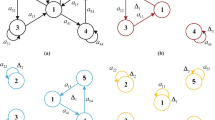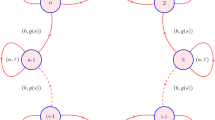Abstract
Anatomical experiments have proved that a large number of ring structures exist in neural networks. Therefore, many scholars have focused on modeling and dynamic analysis of multi-ring neural networks. However, most current research regarding multi-ring neural networks considers the case that rings share only one neuron with each other. This type of connection among rings fails to adequately capture the complex structure of actual neural networks. In this paper, we consider two sharing neurons between rings and propose a bicyclic crossed neural network model with multiple time delays. Then, the stability condition of the proposed neural network model is given without time delays. By choosing the sum of time delays as the bifurcation parameter, the occurrence conditions of tipping due to Hopf bifurcation are derived, and the tipping point (bifurcation threshold) is accurately determined. In addition, the explicit formulae for ascertaining the Hopf bifurcation properties are given by utilizing the center manifold theory, which further reveals the evolutionary tipping mechanism. Finally, through numerical simulations, the validity of the theoretical analysis is verified. The results show that with the increase in time delays, the network will gradually lose stability, and the tipping driven by Hopf bifurcation will occur. Moreover, the magnitude of time delays emerges as a significant determinant of both the amplitude and the oscillation period of unstable neurons.








Similar content being viewed by others
Explore related subjects
Discover the latest articles, news and stories from top researchers in related subjects.Data Availability
The data that support the findings of this study are available from the corresponding author, [MX], upon reasonable request.
References
Briot JP. From artificial neural networks to deep learning for music generation: history, concepts and trends. Neural Comput & Appl. 2021;33:39–65.
Bao H, Chen Z, Cai J, et al. Memristive cyclic three-neuron-based neural network with chaos and global coexisting attractors. Sci China Tech Sci. 2022;65:2582–92.
Nath S. Minimal model for oscillatory dynamics of a nonlinear chemical reaction network. Physica D. 2022;441: 133503.
Hou Q, Wang Z, Tan F, et al. RISTDnet: Robust infrared small target detection network. IEEE Geosci Remote S. 2021;19:1–5.
Lin H, Wu C, Masdari M. A comprehensive survey of network traffic anomalies and DDoS attacks detection schemes using fuzzy techniques. Comput Electr Eng. 2022;104: 108466.
Abdou MA. Literature review: Efficient deep neural networks techniques for medical image analysis. Neural Comput & Appl. 2022;34:5791–812.
Dabbu M, Karuppusamy L, Pulugu D, et al. Water atom search algorithm-based deep recurrent neural network for the big data classification based on spark architecture. Int J Mach Learn & Cyber. 2022;13:2297–312.
Liu N, Ya Z, Tong X, et al. Meshless surface wind speed field reconstruction based on machine learning. Adv Atmos Sci. 2022;39:1721–33.
Zheng Q, Shen J. Turing instability induced by random network in FitzHugh-Nagumo model. Applied Mathematics and Computation. 2020;381: 125304.
Zhou W, Fu B, Wang G. Time-delay memristive recurrent neural network and its complex dynamics. Int J Bifurc Chaos. 2022;32:2250150.
Zhang T, Zhou J, Liao Y. Exponentially stable periodic oscillation and Mittag-Leffler stabilization for fractional-order impulsive control neural networks with piecewise Caputo derivatives. IEEE Trans Cybern. 2021;52:9670–83.
Guo Y, Ge SS, Arbi A. Stability of traveling waves solutions for nonlinear cellular neural networks with distributed delays. J Syst Sci Complex. 2022;35:18–31.
Xu C, Mu D, Liu Z, et al. New insight into bifurcation of fractional-order 4D neural networks incorporating two different time delays. Commun Nonlinear Sci Numer Simul. 2023;118: 107043.
Lu L, Yang L, Zhan X, et al. Cluster synchronization and firing rate oscillation induced by time delay in random network of adaptive exponential integrate-and-fire neural system. Eur Phys J B. 2020;93:1–9.
Wei JJ, Ruan SH. Stability and bifurcation in a neural network model with two delays. Physica D. 1999;130:255–72.
Yu W, Cao J. Stability and Hopf bifurcation analysis on a four-neuron BAM neural network with time delays. Phys Lett A. 2006;351:64–78.
Lin H, Wang C, Tan Y. Hidden extreme multistability with hyperchaos and transient chaos in a Hopfield neural network affected by electromagnetic radiation. Nonlinear Dyn. 2020;99:2369–86.
Tabekoueng NZ, Kengne J, Fotsin HB. Coexistence of multiple stable states and bursting oscillations in a 4D Hopfield neural network. Circuits Syst Signal Process. 2020;39:3424–44.
Fields RD, Stevens-Graham B. New insights into neuron-glia communication. Science. 2002;298:556–62.
Yu D, Zhou X, Wang G, et al. Effects of chaotic activity and time delay on signal transmission in FitzHugh-Nagumo neuronal system. Cogn Neurodyn. 2022;16:887–97.
Lu Y, Xiao M, He J, et al. Stability and bifurcation exploration of delayed neural networks with radial-ring configuration and bidirectional coupling. IEEE Trans Neural Netw Learn Syst. 2023.
Alimi AM, Aouiti C, Assali EA. Finite-time and fixed-time synchronization of a class of inertial neural networks with multi-proportional delays and its application to secure communication. Neurocomputing. 2019;332:29–43.
Vaishwar A, Yadav BK. Stability and Hopf-bifurcation analysis of four dimensional minimal neural network model with multiple time delays. Chinese J Phys. 2022;77:300–18.
Zhang H, Cheng J, Zhang H, et al. Quasi-uniform synchronization of Caputo type fractional neural networks with leakage and discrete delays. Chaos Solitons Fractals. 2021;152: 111432.
Chen S. Traveling wave solutions of diffusive Hindmarsh-Rose-type equations with recurrent neural feedback. J Math Anal Appl. 2021;493: 124513.
Xu C, Liu Z, Liao M, et al. Fractional-order bidirectional associate memory (BAM) neural networks with multiple delays: The case of Hopf bifurcation. Math Comput Simulat. 2021;182:471–94.
Wang T, Wang Y, Cheng Z. Stability and Hopf Bifurcation Analysis of a General Tri-diagonal BAM Neural Network with Delays. Neural Process Lett. 2021;53:4571–92.
Zhou S, Xiao M, Wang L, et al. Bifurcation and oscillations of a multi-ring coupling neural network with discrete delays. Cogn Comput. 2021;13:1233–45.
Misir S, Wu N, Yang BB. Specific expression and functions of circular RNAs. Cell Death Differ. 2022;29:481–91.
Herranz M, Pardos F, Boyle MJ. Comparative morphology of serotonergic-like immunoreactive elements in the central nervous system of kinorhynchs kinorhyncha, cyclorhagida. J Morphol. 2013;274:258–74.
Hu H, Huang L. Stability and Hopf bifurcation analysis on a ring of four neurons with delays. Appl Math Comput. 2009;213:587–99.
Tao B, Xiao M, Zheng WX, et al. Dynamics analysis and design for a bidirectional super-ring-shaped neural network with n neurons and multiple delays. IEEE Trans Neural Netw Learn Syst. 2021;32:2978–92.
Xing R, Xiao M, Zhang Y, et al. Stability and Hopf bifurcation analysis of an (n+m)-neuron double-ring neural network model with multiple time delays. J Syst Sci Complex. 2022;35:159–78.
Cheng Z, Xie K, Wang T, et al. Stability and Hopf bifurcation of three-triangle neural networks with delays. Neurocomputing. 2018;322:206–15.
Zhang Y, Xiao M, Cao J, et al. Dynamical bifurcation of large-scale-delayed fractional-order neural networks with hub structure and multiple rings. IEEE Trans Syst Man Cybern Syst. 2022;52:1731–43.
Gao Y, Chen Y, Xie Y, et al. A class of topological nodal rings and its realization in carbon networks. Phys Rev B. 2018;97: 121108.
Zhang X, Tu H, Guo J, et al. Braess paradox and double-loop optimization method to enhance power grid resilience. Reliab Eng Syst Saf. 2021;215: 107913.
Kaszs B, Feudel U, Tl T. Tipping phenomena in typical dynamical systems subjected to parameter drift. Sci Rep. 2019;9:1–12.
Ehret S, Constantino SM, Weber EU, et al. Group identities can undermine social tipping after intervention. Nat Hum Behav. 2022;6:1669–79.
Liu T, Chen D, Yang L, et al. Teleconnections among tipping elements in the Earth system. Nat Clim Chang. 2023;13:67–74.
Carrier B, Pascal L, Nozais C, et al. Tipping points and multiple drivers in changing aquatic ecosystems: A review of experimental studies. Limnol Oceanogr. 2022;67:312–30.
Jules S, Sylvain B, Patrice G, et al. Can the threat of economic sanctions ensure the sustainability of international fisheries an experiment of a dynamic non-cooperative CPR game with uncertain tipping point. Environ Resource Econ. 2020;76:153–76.
Zhang X, Xu Y, Liu Q, et al. Rate-dependent tipping-delay phenomenon in a thermoacoustic system with colored noise. Sci China Technol Sci. 2020;63:2315–27.
Xiao M, Chen S, Zheng WX, et al. Tipping point prediction and mechanism analysis of malware spreading in cyber-physical systems. Commun Nonlinear Sci Numer Simul. 2023;122: 107247.
Lu Y, Xiao M, Huang C, et al. Early Warning of Tipping in a Chemical Model with Cross-Diffusion via Spatiotemporal Pattern Formation and Transition. Chaos. 2023;33: 073120.
He H, Xiao M, Lu Y, et al. Control of tipping in a small-world network model via a novel dynamic delayed feedback scheme. Chaos, Solitons and Fractals. 2023;168: 113171.
Acknowledgements
This work is supported in part by the National Natural Science Foundation of China under Grant 62073172 and the Natural Science Foundation of Jiangsu Province of China under Grant BK20221329.
Author information
Authors and Affiliations
Corresponding author
Ethics declarations
Ethical Approval
This article does not contain any experiments with human or animal participants performed by any of the authors.
Informed Consent
Informed consent was obtained from all individual participants included in the study.
Conflict of Interest
The authors declare that they have no conflict of interest.
Additional information
Publisher's Note
Springer Nature remains neutral with regard to jurisdictional claims in published maps and institutional affiliations.
Rights and permissions
Springer Nature or its licensor (e.g. a society or other partner) holds exclusive rights to this article under a publishing agreement with the author(s) or other rightsholder(s); author self-archiving of the accepted manuscript version of this article is solely governed by the terms of such publishing agreement and applicable law.
About this article
Cite this article
Du, X., Xiao, M., Ding, J. et al. Bifurcation−Driven Tipping in A Novel Bicyclic Crossed Neural Network with Multiple Time Delays. Cogn Comput 16, 278–292 (2024). https://doi.org/10.1007/s12559-023-10199-4
Received:
Accepted:
Published:
Issue Date:
DOI: https://doi.org/10.1007/s12559-023-10199-4




